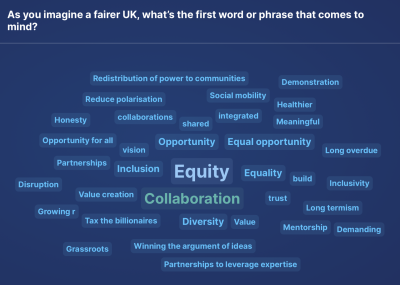As you imagine a fairer UK, what’s the first word or phrase that comes to mind?
That was the opening question posed by Bean’s Social Value Manager, Bethan, at the Institute of Social Value Conference in Birmingham, as she chaired a roundtable exploring how we might co-design a fairer future.
Over fifty social value professionals from across the UK came together for an open, creative conversation — facilitated by a panel of experts — about what fairness could look like, and how social value can help us get there.

The context for fairness
Recent research highlights both the challenges and opportunities shaping fairness in the UK today. Trust and belonging are at an all-time low: 58% of people almost never trust politicians to tell the truth, and seven in ten believe the country is getting worse, not better. At the same time, many of the spaces that foster connection are disappearing — with over a quarter of libraries and 700 play parks having closed in the last decade.
Yet there is cause for optimism. The UK remains the sixth largest economy in the world and ranks third globally for AI innovation. The challenge now is how to harness this economic and technological strength through social value — using policy, investment and partnership to rebuild trust, strengthen community bonds, and create a sense of belonging that feels fair, connected and inclusive.
A shared vision of fairness
The word cloud that opened the session was a hopeful one. Words such as equality, opportunity, inclusion, diversity, trust and empowerment stood out, with collaboration dominating. Together, they painted a picture of a sector ready to move beyond compliance — towards connection, shared purpose and tangible community change.

It also reflected what we see more widely across Bean’s work: a growing maturity in how organisations understand, embed and measure social value, paired with an awareness that lasting fairness will require deeper collaboration, system-level thinking, and at times, disruption.
What are the practical steps?
The second question sparked rich discussion: What practical steps can we, as a social value community, take to help create a fairer society?
Several strong themes emerged:
- Bring commissioners and local government into the conversation. While social value practice has matured within organisations, it remains patchy at system level. There’s a clear opportunity for better communication and shared learning across sectors. Commissioners and those working in planning and procurement need to be part of these discussions if co-design is to become reality. Their involvement is vital to joining up decision-making and embedding social value in long-term infrastructure and communities, not just in individual projects.
- Listen to communities first — and with care. Participants stressed the importance of giving people time and space to shape what matters to them, without creating consultation fatigue. With so many organisations asking similar questions, a more joined-up approach to engagement could reduce duplication and lead to better insight.
- Use data and technology thoughtfully. There was curiosity about how AI and shared digital tools might support more inclusive, consistent and less burdensome engagement.
- Measure what matters. Reporting often focuses on outputs — hours spent, funds allocated — rather than the difference made. Participants called for more flexible, outcome-focused measurement that reflects real community change and can adapt as needs evolve.
- Beyond measurement to meaning. What came through strongly was a collective appetite to move from good intent to shared action: to build fairness through collaboration between sectors, across systems, and most importantly, with communities.
Reflecting on the session, it’s clear the sector has made huge strides in embedding social value. The next step is to ensure the right people are in the room — commissioners, policymakers and communities — to co-design what comes next.
A fairer UK will depend on widening these conversations and ensuring that those with the power to commission, invest and plan are working hand-in-hand with the people and places they serve.

